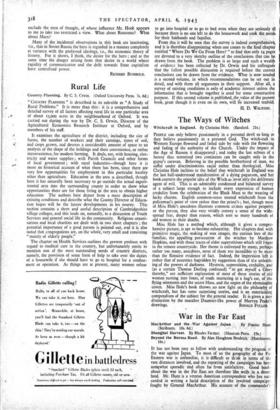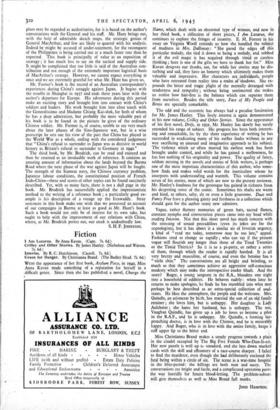MacArthur and the • War Against Japan. By Frazier Hunt
War in the Far East
(Scribners. 10s. 6d.) Shanghai Harvest. By Rhodes Farmer. (Museum Press. 15s.) Beyond the Burma Road. By Alan Houghton Brodrick. (Hutchinson. 16s.)
IT has not been easy to follow with understanding the progreis o• the war against Japan. To most of us the geography of the Fa Eastern war is unfamiliar, it is difficult to think in terms of th_ vast distances involved, and the reporting of the campaigns has bee somewhat sporadic and often far from satisfactory. Good book about the war in the Far East are therefore like wells in a deser land. Mr. Hunt is a veteran American correspondent who has suc- ceeded in writing a lucid description of the involved campaign- fought by General MacArthur. His account of the commander%
plans may be regarded as authoritative, for it is based on the author's conversations with the General and his staff. Mr. Hunt brings out, with the help of admirable sketch maps, the strategic genius of General MacArthur, and few are likely to quarrel with his analysis. Indeed he might be accused of under-statement, for the reconquest of the Philippines is being carried out at a much faster rate than he expected. This book is principally of value as an exposition of strategy ; it has much less to say on the tactical and supply side. It might be complained that too little is said of the Australian con- tribution and not enough of the extremely important logistical basis of MacArthur's strategy. However, we cannot expect everything at once and we arc extremely grateful for what Mr. Hunt has given us.
Mr. Farmer's book is the record of an Australian correspondent's experiences during China's struggle against Japan. It begins with the trouble in Shanghai in 1937 and ends three years later with the author's departure for Europe. His adventures during this period make an exciting story and brought him into contact with China's soldiers and leaders. His work brought him into close touch with the Generalissimo and Madame Chiang Kai-shek, for both of whom he has a deep admiration, but probably the most valuable part of his book is to be found in the picture he gives of the ordinary Chinese soldier. Mr. Farmer is, of course, unable to say very much about the later phases of die Sino-Japanese war, but in a wise postscript he sets out his view of the part that China has played in the World War as a whole, ending with the considered judgement that "China's refusal to surrender to Japan was as decisive in world history as Britain's refusal to surrender to Germany in 194o."
The third book, by Mr. Brodrick, can be read and enjoyed and then be retained as an invaluable work of reference. It contains an amazing amount of information about the lands beyond the Burma Road where the next phase of the war against Japan will be fought. The strength of the Siamese navy, the Chinese currency problem, Japanese labour conditions, the constitutional position of French Indo-China—these and scores of other topics can be found succinctly described. Yet, with so many facts, there is not a dull page in the book. Mr. Brodrick has successfully applied the impressionistic method to the writing of a reference book ; a particularly good ex- ample is his description of a voyage up the Irrawaddy. Stray sentences in this book make one wish that we possessed an account of our campaigns in Burma at least as good as Mr. Hunt's book. Such a book would not only be of interest for its own sake, but ought to help with the improvement of our relations with China, where, as Mr. Brodrick points out, our stock is undoubtedly low.
S. H. F. JOHNSTON.



























 Previous page
Previous page